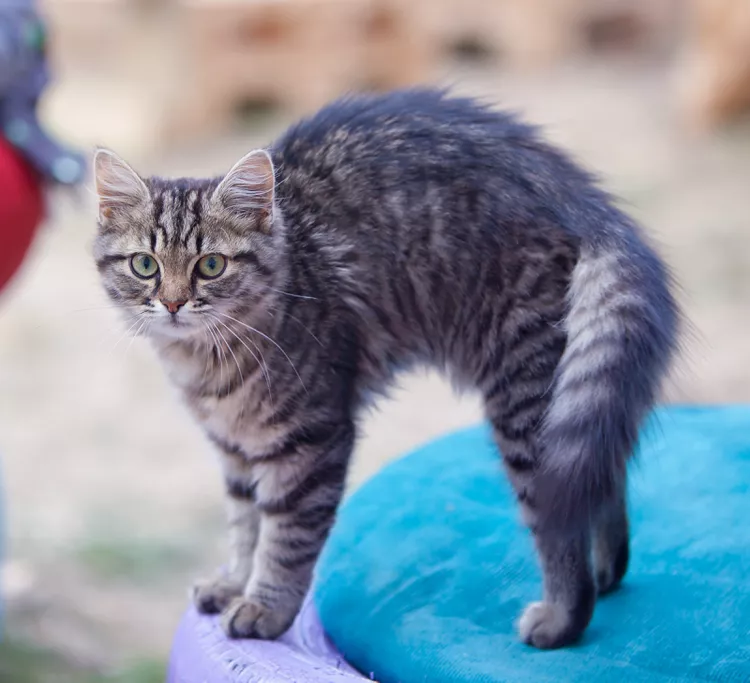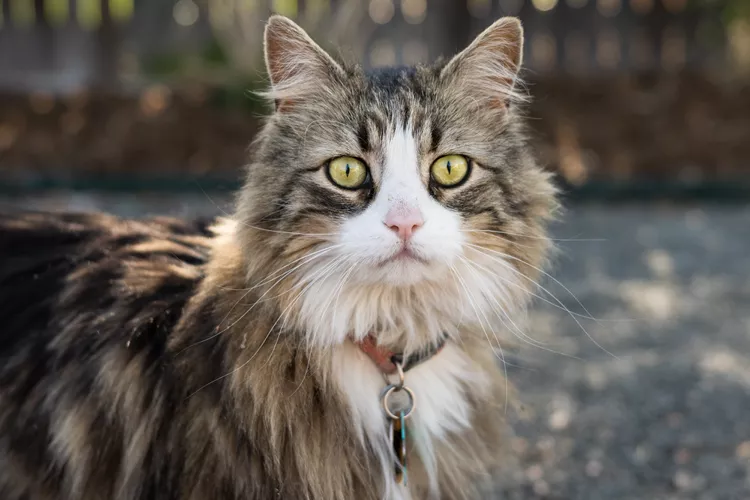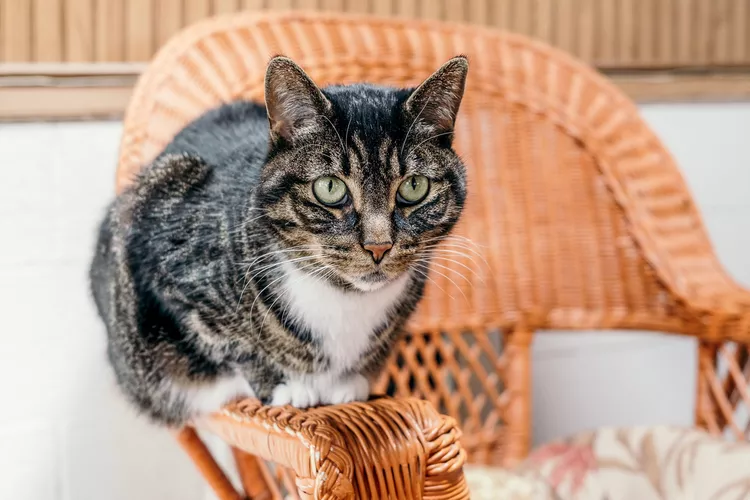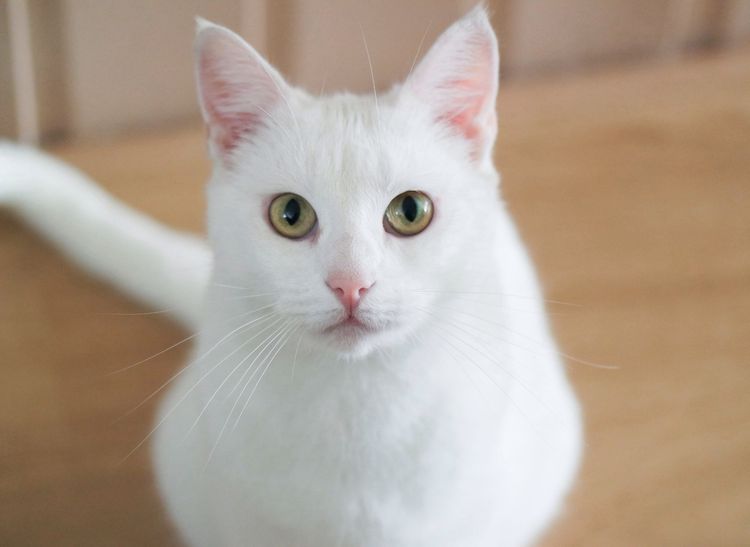
Feline Hyperesthesia Syndrome (FHS), commonly called rippling skin disorder, can be mistaken for normal crazy behavior in cats. However, it's a syndrome that may require treatment. Tuning in to the symptoms, such as skin twitching, abnormal vocalizations, and erratic behavior will help you and your veterinarian identify the need for medical intervention.
Learn more about Feline Hyperesthesia Syndrome and its common treatments and prevention methods.
Feline Hyperesthesia Syndrome (FHS) is a disorder in which the characteristic symptom is rippling or shuddering skin (particularly on the back, near the base of the tail). FHS also manifests as behavioral abnormalities that are even more concerning, such as excessive vocalization and generalized agitation.
To track symptoms that may indicate FHS, consider documenting the frequency of twitching or odd behaviors, such as:
The exact cause of Feline Hyperesthesia Syndrome is often unknown. Because of this, FHS has been categorized as a behavioral, neurological, and/or skin disorder. While any cat can be affected by it, Asian breeds such as the Siamese, Burmese, Abyssinian, and Persian tend to be diagnosed more frequently. Most cats affected by Feline Hyperesthesia Syndrome start to exhibit symptoms between one and seven years of age. Possible triggers include:
Diagnosis of FHS is often a process of elimination. A veterinarian will often look for evidence of skin disease, trauma, or underlying health conditions before making a diagnosis. Because this condition is so often idiopathic (no known cause), your doctor may recommend dietary and environmental modifications before opting for more diagnostic tests like an MRI. Of course, if seizures have been noted, then neurological tests may be recommended.
A cat with FHS can be helped at home by relieving stressors along with providing exercise-based activities, such as interactive play with wand toys. Clicker training, a very effective and fun behavioral modification approach, may be used to stimulate a cat's activity level and alleviate anxiety.
Removing negative influences and exposures, such as other aggressive pets or loud noises, can help. A diet change to a hypoallergenic diet may be tried in cats with known or suspected allergies. Effective flea control is a must.
Anti-convulsant medication such as phenobarbital may occasionally be prescribed for the FHS cat that experiences seizures, or low dosages of mood-stabilizing drugs may be prescribed to help calm a cat.
Although a cat with FHS may never be entirely "cured" with modifications or medication, you can work with a pet behaviorist to help your cat feel happier and more comfortable.
The quality of life for a cat with FHS depends on the cause of the condition. The goal of treatment is to make a cat more comfortable. If a recommended treatment does not seem to be working, a follow-up with a veterinarian is recommended.

75 Unisex Cat Names
Our gender neutral cat names perfect for your feline friend, with a diverse selection of fun and inclusive options to fit your pet's disposition.
Why Does My Cat Stink?
Is your cat stinky? Find out about the causes of bad odors in cats and when it is something to be concerned about. Learn how to help your stinky cat.
Signs of Rabies in Cats
Rabies is a fatal and contagious virus that can affect cats. Learn about the signs of rabies in cats and what to do about them.
Can Cats Eat Dog Food?
Can cats eat dog food? In small amounts, it's unlikely to be a problem, but long-term feeding of dog food to cats can cause health issues and malnutrition.
Exploring the Different Types of Pet-Friendly Beaches
Are you looking for pet-friendly beaches? Learn about the different types of pet-friendly beaches, their locations, and tips for visiting them with your pet.
Pulled Muscles in Dogs
A pulled muscle is one of the most common injuries seen in dogs. What can you do if your dog pulls a muscle and how can you prevent it?
Fibrosarcoma in Cats
Fibrosarcomas are potentially fatal soft tissue tumors that can occur in cats. Learn the causes, treatment, and prevention.
Alopecia in Dogs
Alopecia leads to hair loss and bald spots in dogs. Some breeds may be more at risk. Learn common causes, treatment, and prevention of dog alopecia.
Is Acetaminophen Safe for Dogs?
Acetaminophen is used by humans for pain and fever relief, but is it safe for dogs? Here's what you need to know before giving your dog acetaminophen.
Can Dogs Eat Almonds? Understanding the Risks and Guidelines
Can dogs eat almonds? While a couple likely won't hurt, it's best to avoid feeding your dog this nut. Learn the risks here.
Keeshond: Dog Breed Characteristics & Care
Learn about the keeshond dog, also known as the Dutch Barge Dog. This fluffy spitz breed was bred to guard, but also makes a friendly companion.
Is Rosemary Safe for Dogs?
Rosemary is used both for cooking and as a supplement with many reported health benefits in people, so you may be wondering if it is safe to give to your dog. Rosemary is considered non-toxic for dogs but with some caveats.
7 Hybrid Cats Breeds
Hybrid cat breeds can make appealing pets since they look more exotic than domestic house cats, but they aren't for everyone.
The Best White Cat Breeds to Keep as Pets
Several breeds can result in white cats with long or short hair. Find out the pros and cons of these white cat breeds.
11 Cute Pictures of Ragdoll Cats
Ragdoll cats are known for their beautiful coats and bright, blue eyes. Learn all about the breed, and check out some cute pictures here.
7 Reasons Why Your Cat Eats Paper, and How to Stop It
Is your cat eating paper? Learn why your cat is doing this, and find out how to put a stop to it.
Feist: Dog Breed Characteristics & Care
Feists are small, short-haired dogs developed to hunt squirrels and catch vermin. These high-energy, affectionate pooches make great companion animals.
Dogue de Bordeaux (French Mastiff): Dog Breed Characteristics & Care
Learn about the Dogue de Bordeaux, also called the French mastiff. Although large and muscular, they’re known for their calm and gentle personality.
How to Stop Your Dog From Fearing Men
Many dogs have a phobia of men. Learn how to help your dog overcome its fear through desensitization and training while keeping everyone safe.
Why Dogs Eat Poop and How to Stop Them
Is your dog eating poop? Some dogs do this because of stress or illness. Learn how to prevent stool eating, or coprophagia, in dogs.